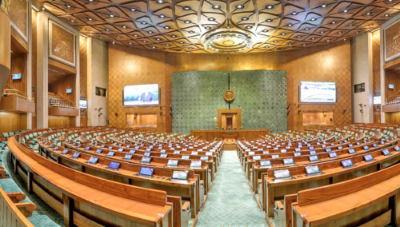Context-
The winter session of Parliament in 2023 witnessed a notable event in Indian politics: the suspension of a significant number of Opposition Members of Parliament (MPs) for causing disruptions during House proceedings. This event not only raised questions about the functioning of parliamentary democracy but also highlighted the crucial role played by Opposition MPs in shaping legislative discourse and holding the government accountable.
Background: The Suspension Event
The suspension of 141 MPs, including 95 from the Lok Sabha and 46 from the Rajya Sabha, stemmed from demands made by the Opposition to discuss a security breach that occurred in Parliament on December 13, 2023. The intrusion by unidentified individuals using gas canisters prompted concerns about parliamentary security and the need for a thorough investigation. However, the government's response to these demands led to disruptions, ultimately resulting in the suspension of these MPs.
Understanding the Importance of Opposition Role
Former Prime Minister Atal Bihari Vajpayee's emphasis on the collaborative role of the Opposition in governance underscores the significance of healthy debates and dissent in a democratic framework. The Opposition serves as a vital check on the government's actions, ensuring transparency, accountability, and the representation of diverse viewpoints within the legislative process.
Several suspended MPs have made significant contributions to India's parliamentary landscape, reflecting their commitment to their constituencies and proactive engagement in policy-making:
Shashi Tharoor (Congress, Lok Sabha):
As a three-time MP from Thiruvananthapuram, Kerala, Tharoor boasts an impressive 94% attendance record, actively participating in 99 debates and introducing 13 Private Member’s Bills. His recognition with the Sansad Ratna Award in 2020 highlights his dedication to parliamentary duties.
S. Jothimani (Congress, Lok Sabha):
Jothimani, representing Tamil Nadu's Karur constituency, has actively addressed various issues such as employment schemes, infrastructure development, and flood relief. Her focus on critical topics like menstrual hygiene and paternity benefits through Private Member Bills underscores her commitment to social welfare.
Manoj Kumar Jha (Rashtriya Janata Dal, Rajya Sabha):
Jha, representing Bihar, has demonstrated a high level of participation with a 97% attendance rate. His advocacy for legislative reforms, including the Prevention of Torture Bill, 2022, reflects his dedication to addressing pressing issues affecting the nation.
Supriya Sule (Nationalist Congress Party, Lok Sabha):
Representing Maharashtra's Baramati constituency, Sule has actively engaged in debates and raised pertinent questions on a wide range of topics, including census amendments and rights of widows and single women. Her numerous Private Member Bills demonstrate a proactive approach to legislative advocacy.
Gaurav Gogoi (Congress, Lok Sabha):
Gogoi's focus on issues such as air quality management and energy conservation reflects his commitment to environmental sustainability and public health. His recognition as the Best Parliamentarian Award recipient in 2018 underscores his contributions to legislative discourse.
Vandana Hemant Chavan (Nationalist Congress Party, Rajya Sabha):
Chavan's involvement in diverse social issues and introduction of Private Member Bills highlights her efforts towards addressing critical social issues. Her accolades, including the Lokmat Award and recognition as the Best Woman Parliamentarian, underscore her contributions to parliamentary proceedings.
Derek O’Brien (All India Trinamool Congress, Rajya Sabha):
O’Brien's active participation in debates and introduction of Bills focusing on education and public health demonstrates his commitment to social welfare and education reform. His recognition with the Lokmat Parliamentary Award reflects his significant contributions to legislative discussions.
Kunwar Danish Ali (Bahujan Samaj Party, Lok Sabha):
Despite recent party suspension, Ali has maintained a remarkable attendance record and actively engaged in debates and questioning. His focus on electoral reforms and constitutional amendments underscores his commitment to strengthening democratic institutions.
Significance and Implications
The contributions of these suspended MPs highlight the critical role of the Opposition in shaping India's legislative discourse and fostering accountability within the parliamentary system. However, the suspension of these MPs raises concerns about the stifling of dissent and the implications for democratic governance. It calls for a reevaluation of democratic norms and underscores the need for a collaborative approach between the government and the Opposition to ensure effective governance and inclusive decision-making processes.
Conclusion
In conclusion, the suspension of Opposition MPs during the winter session of Parliament 2023 reflects the complex dynamics of Indian politics and the challenges inherent in maintaining a vibrant democracy. Recognizing the contributions of suspended MPs underscores the importance of diverse voices and viewpoints in legislative deliberations. Moving forward, fostering an environment of mutual respect, dialogue, and collaboration between the government and the Opposition is essential for upholding democratic principles and ensuring inclusive governance in India.
|
Probable Questions for UPSC Mains Exam-
|
Source- The Hindu







